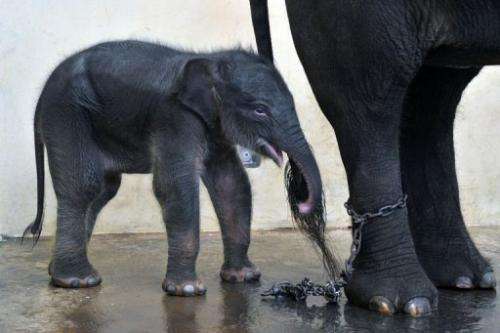Endangered Sumatran elephant born in captivity

A baby Sumatran elephant peeps out timidly from between the legs of its mother at an Indonesian zoo, where her birth has given a boost to the critically endangered animal.
Kartini, named after the country's most celebrated feminist, Raden Ajeng Kartini, was born on Friday under a captive breeding programme and is in good health.
"Her birth is the result of conservation efforts at the zoo, and we're all happy to welcome her," Taman Safari zoo spokesman Yulius Suprihardo told AFP.
The zoo said that she seemed happy, and was feeding from her mother every 30 minutes.
The 105 kilogram (231 pound) elephant was born just south of the capital Jakarta, but the animal is native to Sumatra island, where its population has halved in one generation, according to environmental group WWF.
There are fewer than 3,000 Sumatran elephants remaining in the wild, according to the International Union for Conservation of Nature.
Rampant expansion of palm oil, paper plantations, and mines, has destroyed nearly 70 percent of the Sumatran elephant's forest habitat over 25 years, the WWF says, and the animals remain a target of poaching.
Three of the elephants were found dead in Riau province in November last year, with officials saying they were probably poisoned in a revenge attack by palm oil plantation workers who suspected the animals had destroyed their huts.
(c) 2013 AFP





















